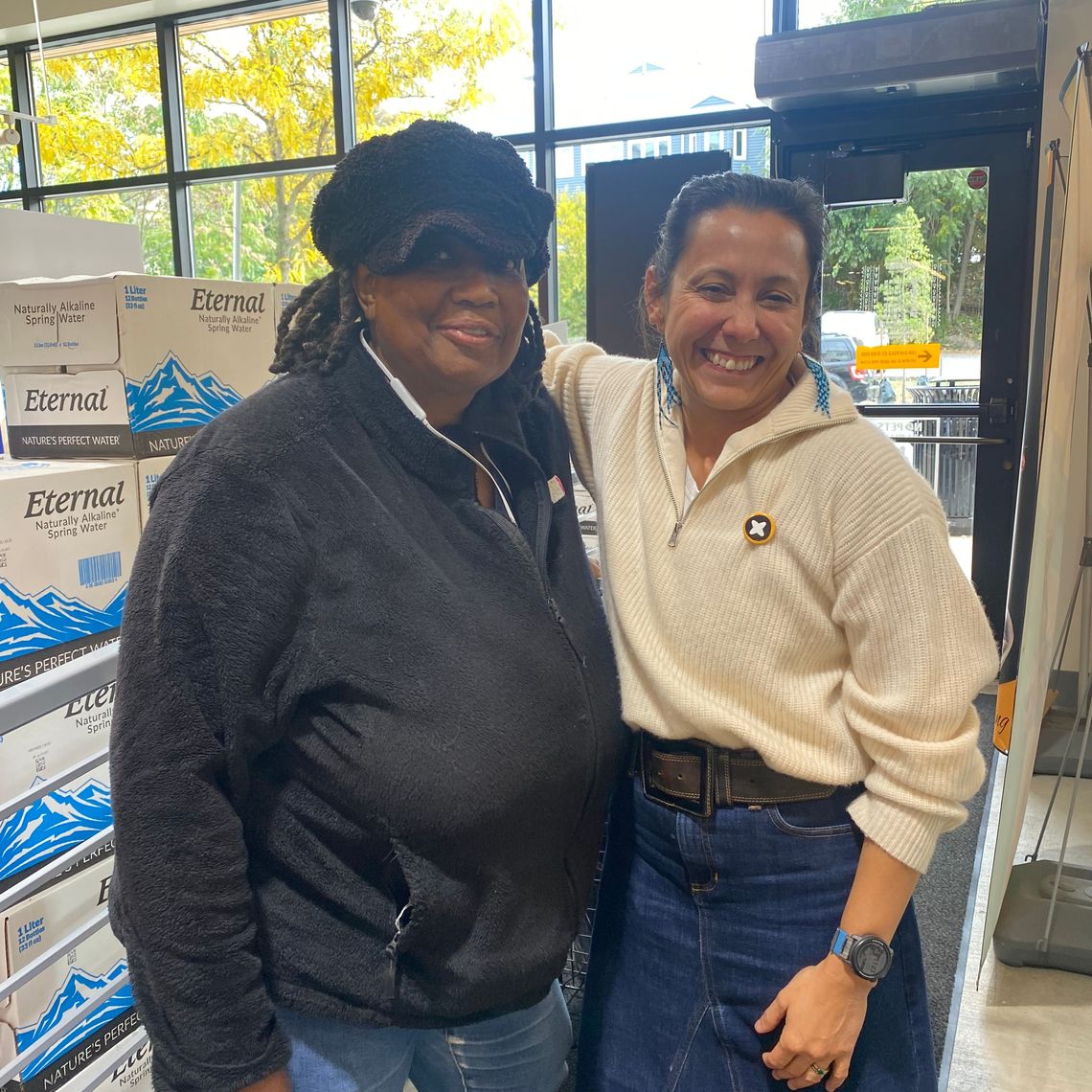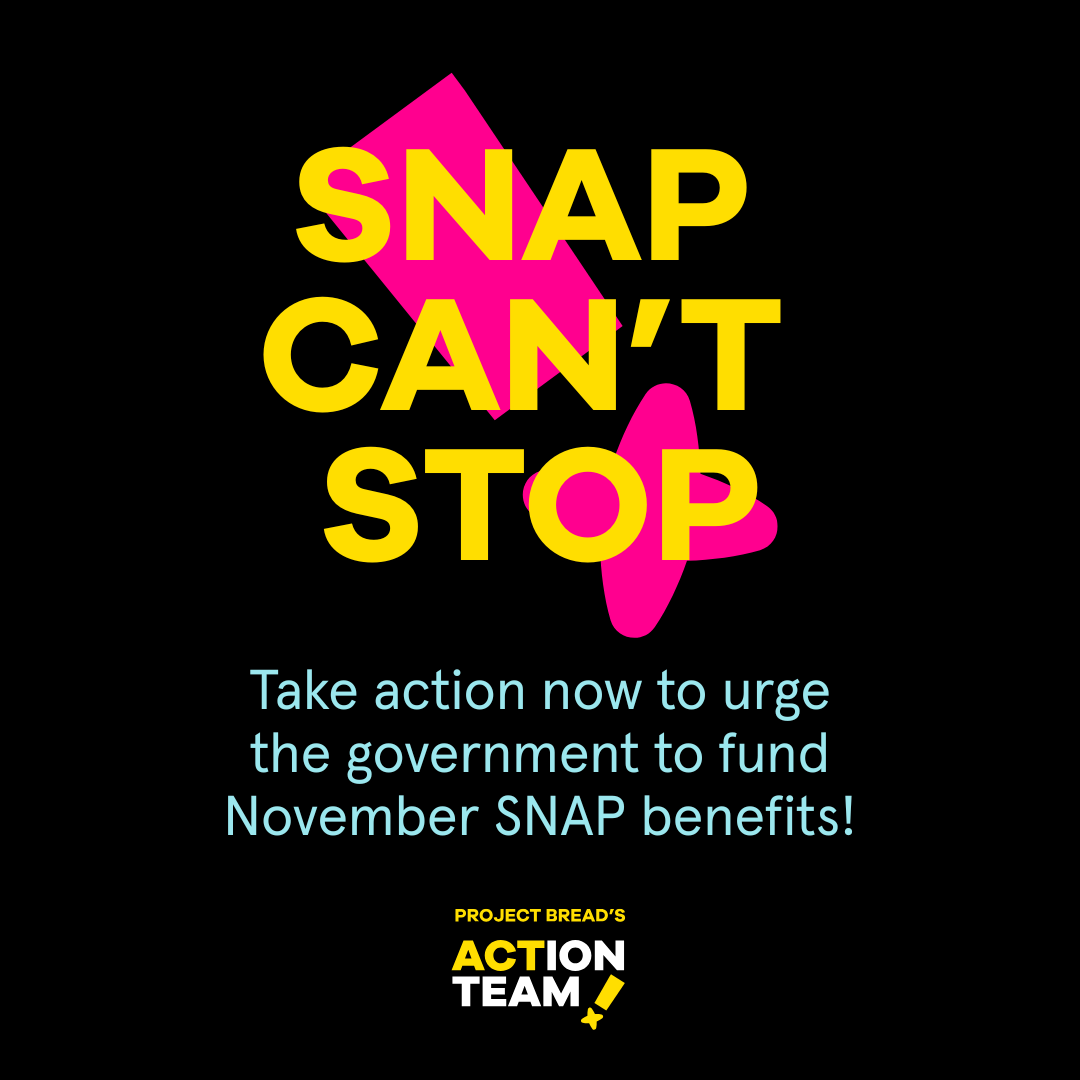SNAP Can’t Stop: If the Federal Government Fails to Fund SNAP, Massachusetts Must Step Up
Project Bread

Right now, we are quickly approaching November 1. Normally, that might mean embracing the second half of fall or welcoming the holiday season. But this year, it means SNAP benefits are running out for millions of Americans, stripping them of their ability to put food on the table.
An October 27 message on the USDA’s website reads, “Bottom line, the well has run dry. At this time, there will be no benefits issued November 01.” The USDA egregiously states they are unable to use the contingency fund for SNAP, despite that being the purpose of the fund.
At the Project Bread office on Friday, where we hosted a press conference about the impact of SNAP cuts with Congresswoman Ayanna Pressley and Senator Ed Markey, Pressley shared a story about visiting Orchard Gardens, a K-8 school in Roxbury. “When I ask, ‘What is the number one issue when children come to your office?’ Hunger. And that is why that school has had, already for 15 years, a food pantry. Now we know a hungry child can't learn.”
Hunger among children, families, seniors, and more will increase if the government fails to fund SNAP. Right now, SNAP benefits are expected to run out on November 1. The government has been shutdown since September 19, and as we enter the 27th day, people all across Massachusetts are feeling the strain.
“This is policy violence. It is violent and—this is the part that gets me—a hundred percent preventable,” Pressley said. “Our families are now staring down a November 1st cliff, when for the first time in history, an administration could fail to fund the SNAP program.”

Who Uses SNAP?
Starting Saturday, more than 1 million Massachusetts residents could have their SNAP benefits delayed because of the federal shutdown and the Trump Administration’s refusal to release SNAP contingency funds created by the Biden Administration for this very reason.
If this decision stands, 337,000 children in our state will lose access to the food they need— marking the first time in history that this vital program has gone unfunded. We can’t let SNAP stop. More than 1 million people in Massachusetts use SNAP to buy food each month, and families will feel the impact immediately if benefits are cut off. This crisis is preventable. The federal government is refusing to provide transparency and failing to use the contingency funds set aside for this exact purpose.
In every corner of Massachusetts, households put food on the table with SNAP.
This map shows how many households in each Massachusetts county rely on SNAP benefits for food. If a government shutdown disrupts these benefits, families across every corner of the state would be impacted, underscoring the widespread reliance on this critical support.
We’re calling on the Trump Administration and the Department of Agriculture to fund SNAP, because it is their legal and moral obligation, and no one should have to worry about where their next meal is coming from when that fate can be prevented.
“In the richest country in the world, this is a complete lack of conscience…There is no reason for grandma or grandpa to have to skip meals. There is no reason for a student to hide their stomach rumblings at school in shame,” said Senator Ed Markey. “There is no reason for cupboards or refrigerators to be empty.”
What are the Consequences of Cutting SNAP?
More than $210 million in SNAP benefits are spent each month at over 5,500 retailers in Massachusetts, accounting for $1 out of every $5 spent at grocery stores in the state. Delaying these funds would create significant economic disruptions in our communities, particularly as Massachusetts faces a slowing economy. Food banks and pantries are already experiencing increased demand and are unable to make up for the shortfall in SNAP benefits.
Low-income households and the Massachusetts economy simply cannot afford any delays. Additionally, SNAP contributes $2.6 billion to Massachusetts each year and supports more than 5,500 local businesses. If these funds were to disappear, it would result in job losses and decreased revenue.
“SNAP is our nation's most effective tool against hunger, providing nine meals for every one meal offered through a food bank,” said Jennifer Lemmerman, Chief Policy Officer at Project Bread. “Emergency food providers are already stretched beyond capacity. They cannot absorb this flow. So let's be clear, this is not an inevitable consequence of the shutdown. It is a political choice and one that could be reversed today with a single decision by the US Department of Agriculture and the Trump administration to use its SNAP contingency fund.”
We’re Seeing the Impact Firsthand
We are already beginning to see an influx of calls from residents across the state, wondering where to turn if their benefits run out and how to get information about the impact on their benefits. This is only going to grow as we get closer to November 1. People are worried about how they will get by if they don’t have SNAP funds to purchase food. Confusion and frustration will continue to grow.
Soraya, a grandparent and caretaker raising grandchildren, spoke at the press conference with Gov. Maura Healey last Friday. She expressed her concern about the possibility of SNAP benefits being cut in November.
“I rely on these benefits to help feed my family, especially my grandchildren, who depend on me for their daily meals,” they shared. “Losing SNAP, even for a single month, would be devastating. The cost of groceries continues to rise, and without that support, I honestly don’t know how I would be able to put enough food on the table. My grandchildren need proper nutrition to stay healthy and focused in school — and I do everything I can to make sure they have that stability.”
Soraya added that the program is not just a line in the budget, but a lifeline for families like theirs. “It helps us survive and maintain dignity through difficult times. Cutting these benefits would cause real harm to children, seniors, people with disabilities, and working families across our community,” they said.
Soraya is far from the only person feeling the pressure. Hardworking people are taking on second or third jobs, like this federal employee who’s begun delivering food just so he can feed his family.
“I used to be the one ordering DoorDash/Uber Eats—now I’m the one delivering during the shutdown for breakfast and lunch for a little extra funds to stay on top of bills. Much respect to everyone out here hustling. This grind is real.”
It may sound dystopian, but it’s reality.
On November 1, over 1 million Massachusetts resident will lose access to SNAP. In this brief video, Project Bread’s CEO, Erin McAleer, shares what’s happening and how Project Bread is responding.

Many families constantly worry about having enough to eat. With the cost of living, groceries, and utility bills higher than ever, disposable income is at an all-time low. People are worried about staying afloat. Halloween costumes, holiday gifts, and happy family meals are all off the table. At least, until decision-makers choose to do what’s necessary and fund SNAP.
We Are Calling for the Federal Government to Fund SNAP
The evidence of harm caused by inadequate food access is clear and overwhelming, and the solution lies within reach. "One-third of all Massachusetts residents are running low or cannot afford to buy enough food each month," Markey said.
Access to food is not a luxury, but a fundamental human right. It is unacceptable that millions will lose their SNAP benefits because the Trump administration refuses to use readily available funds. We must continue to advocate for SNAP and hold our leaders accountable.
“In the wealthiest nation on the planet, no one should go to bed hungry. Food is not a privilege. It is a right, and we will not stop fighting until that right is guaranteed for everyone,” Pressley said.

Act Now
This is preventable.
The Trump Administration plays a critical role in resolving the shutdown, and the U.S. Department of Agriculture can release contingency funds to keep benefits flowing.
Our Massachusetts leadership must also be ready to step in and protect families from hunger.
Act now: Send a message to the USDA to release SNAP contingency funds
Rally for SNAP at the State House
On Tuesday, October 28, 12 p.m. Proect Bread led the Make Hunger History coalition, anti-hunger leaders, advocates, allies, legislators, and impacted neighbors to rally in support of SNAP.
Attorney General Andrea Campbell kicked off our rally, announcing she and 24 other state attorneys general filed suit against the Trump administration for “unlawfully” suspending SNAP payments set to run out Nov. 1 amid the ongoing government shutdown.
The Trump administration could stop this. Congress could stop this. And if that inaction continues, the state must be prepared to step in to protect families from hunger. Project Bread is providing clear information, connecting people to resources, and calling on every level of government to act now to keep food on every family’s table.

Make a Contribution
Project Bread's Resilience Fund
In response to these new and urgent threats, Project Bread has launched the Resilience Fund.
Project Bread’s Resilience Fund is a dedicated, strategic initiative created in response to unprecedented attacks to federal nutrition programs. It is a vehicle for both immediate hunger relief, giving us the flexibility and capacity to support our communities as the full impact of this crisis unfolds. This fund enables us to meet the moment—not only to respond to this crisis, but to build durable solutions in real time.